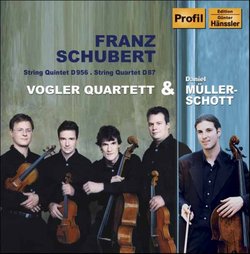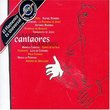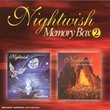| All Artists: Franz Schubert, Vogler Quartet, Daniel Muller-Schott Title: Schubert: String Quintet, D956, & Quartet, D87 Members Wishing: 0 Total Copies: 0 Label: Profil - G Haenssler Original Release Date: 1/1/2006 Re-Release Date: 6/20/2006 Genre: Classical Styles: Chamber Music, Historical Periods, Classical (c.1770-1830) Number of Discs: 1 SwapaCD Credits: 1 UPC: 881488505122 |
Search - Franz Schubert, Vogler Quartet, Daniel Muller-Schott :: Schubert: String Quintet, D956, & Quartet, D87
 | Franz Schubert, Vogler Quartet, Daniel Muller-Schott Schubert: String Quintet, D956, & Quartet, D87 Genre: Classical |
Larger Image |
CD DetailsSimilar CDs
|
CD ReviewsDon't miss this one! Richard Steiger | Murray, KY USA | 08/15/2006 (5 out of 5 stars) "My touchstone for Schubert's sublime string quintet has always been the performance with Stern, Casals and co., currently available on Sony, coupled with a poor performance of the Fifth Symphony (enlivened only by an amusing false entrance of the strings in the first movement). I don't know if this live performance is quite as good, but if it isn't, it's pretty close. Stereo is an enormous advantage in this score, enabling one to hear the intricate interplay between the instruments and emphasizing the eeriness of the slow movement (though this movement must really be heard live). As for the interpretation itself, the middle section of the slow movement is played at a slower tempo than Casals & Co take it, making it sounds less passionate and more resigned--certainly a valid interpretation. The last movement is particularly impressive. This movement can be somewhat of a letdown, but the Voglers' enormous vitality prevents that here. I actually prefer their performace of this movement to the Casals'. The problem for me with this movement is reconciling the first theme (clearly Hungarian) with the second theme (equally clearly Viennese). The Voglers downplay the schmaltzy qualities of the second theme, and for once the movement seems structurally integrated. In sum, with splendid sound and an almost totally quiet audience, this is a completely satisfying performance." Joins the Best Schubert Quintet Recordings J Scott Morrison | Middlebury VT, USA | 06/27/2006 (5 out of 5 stars) "There is no question at all that the String Quintet represents Schubert's greatest masterpiece of chamber music. True, he wrote such favorites as the 'Death and the Maiden' Quartet and the 'Trout' Quintet, but wonderful as they are they come nowhere close to the mastery and effectiveness of the Quintet. Musicians have loved it unstintingly ever since it entered the repertoire and there have been many wonderful recordings of it. Add to that list the present performance which was recorded live in 2005 by the Vogler Quartet, a group then celebrating their twentieth anniversary, having early on won the coveted Evian International String Quartet Competition and having maintained the same personnel since 1985. Early in their existence they were considered just a little cautious and occasionally the adjective 'Germanic' was applied to their playing. But in the past ten or more years or so they have mellowed and certainly play more freely and with more spontaneous emotion than in the early years. That is what they bring to this performance of the Quintet. If ever the epithet 'Romantic' is used about this work, it would be aptly applied to this performance. There are, in fact, unmarked dynamic and tempo variations that can only come from a quartet being so unified as to allow for all four players to breathe, phrase and mold as one. There will be some, I imagine, who would find fault with the emotionality of this performance, saying that the Voglers distort Schubert's intent. But I don't think that's the case.
And when we get to the greatest of all of Schubert's chamber music movements, the Adagio, the playing here is simply above praise. I recall reading that Arthur Rubinstein requested this movement be played at his funeral. One can easily understand that desire: this is the purest, most moving of all Schubert's writing, in my opinion. The Voglers play it with deep-felt emotion and impeccable control, a perfect combination for this movement. Listen to the inevitability of those pizzicato cello notes on beats 1 and 6 of every measure which are eventually joined by pizzicato violin/viola notes on beats 3 and 4. They are, yes, inevitable, but also somehow manage to convey a faltering heart. (Let us remember that Schubert wrote this work in 1828, just weeks before his death, which he knew was coming.) The irruption of agitation in the middle of the movement is not played here as a change of mood but rather as a weak struggle against the inevitable. Glorious. The other three movements, while not as striking -- what could be? -- are played by the Voglers with the same kind of conviction. This is a very strong performance. I had not realized this was a live performance until the burst of applause at the end. There certainly was no audience noise until the applause. Sonics are exemplary. The CD is rounded off with one of Schubert's earliest chamber works, the quartet D87 written when he was only fifteen and still using Mozart and Haydn as models. The Vogler play it in its original published order; some groups transpose the original movements II & III because an early publisher changed their order; indeed the current Eulenberg score places the Scherzo third. But Schubert's original intent was to have it played second. This quartet is sunny, charming and warm-hearted. All the movements, oddly, are in the same key, E flat major, except for a brief excursion into the relative minor, C minor, in the trio of the scherzo. The Vogler Quartet (Tim Vogler and Frank Reinecke, violins; Stefan Fehlandt, viola; Stephan Forck, cello) are joined by cellist Daniel Müller-Schott for the Quintet. There is a touching note in the booklet about the fact that the recording was originally intended to include noted cellist Boris Pergamenschikov, but he died after the group had played the Quintet in concert but before they could record it. Scott Morrison" |


